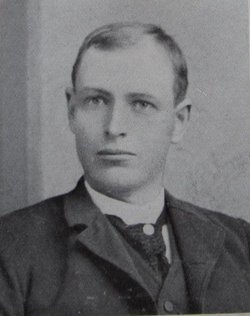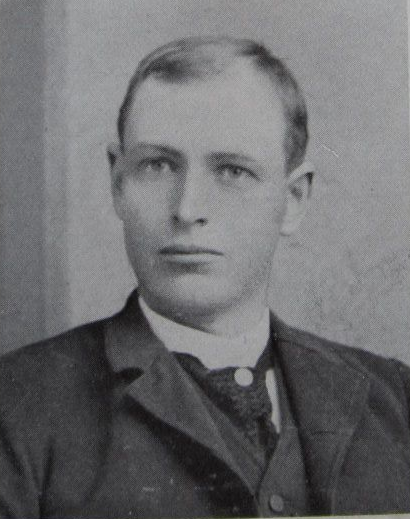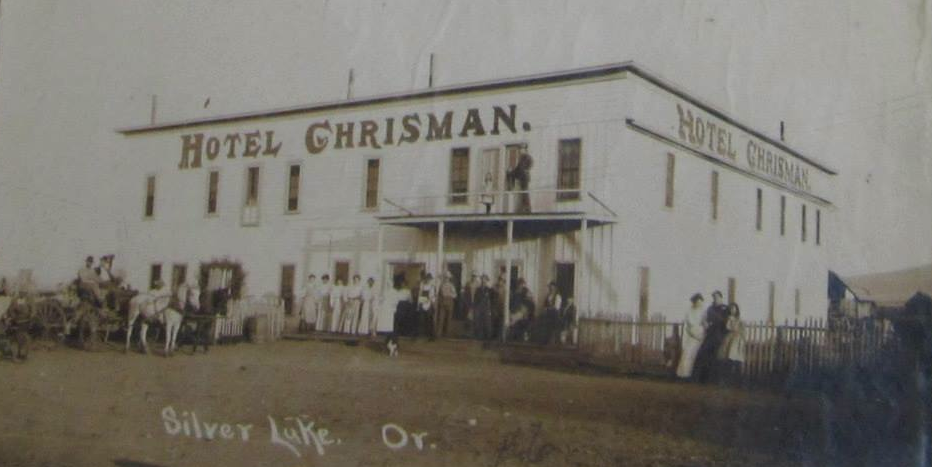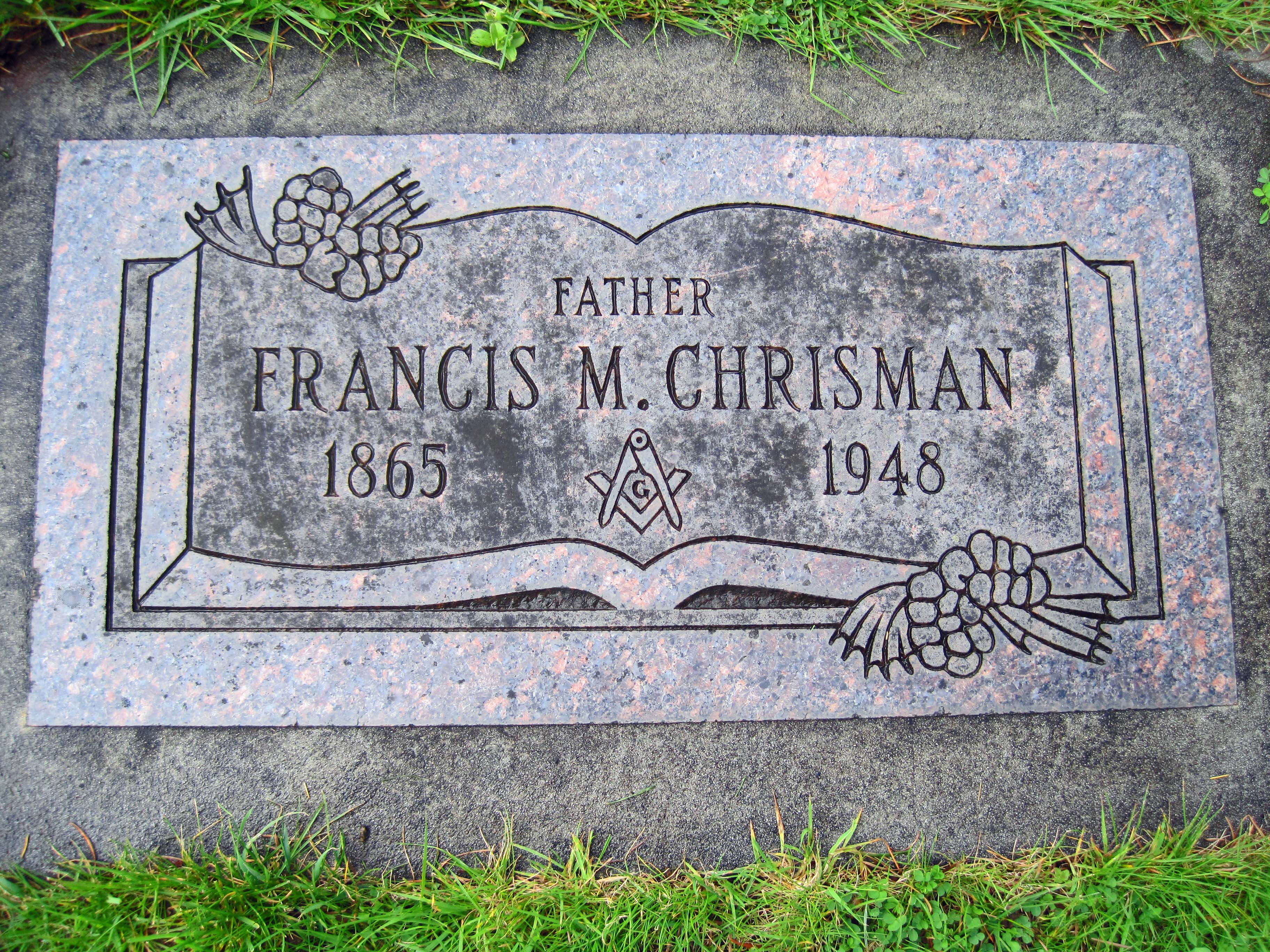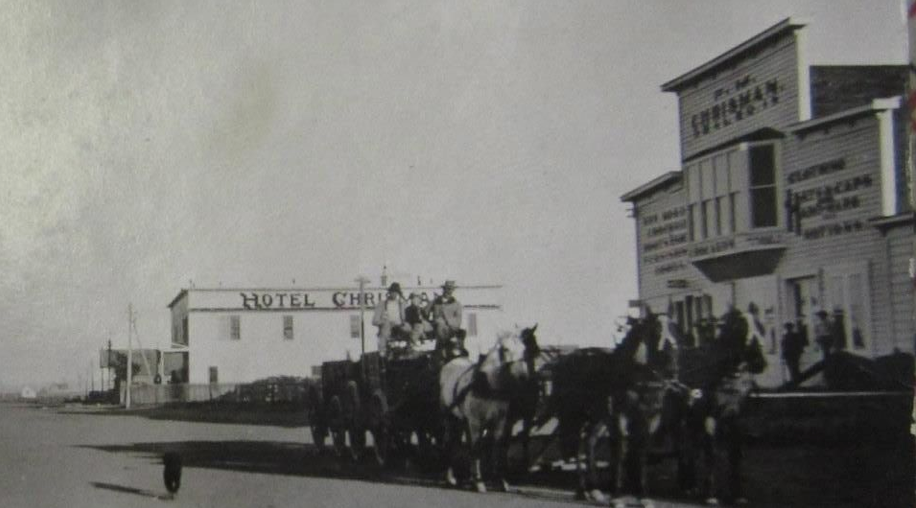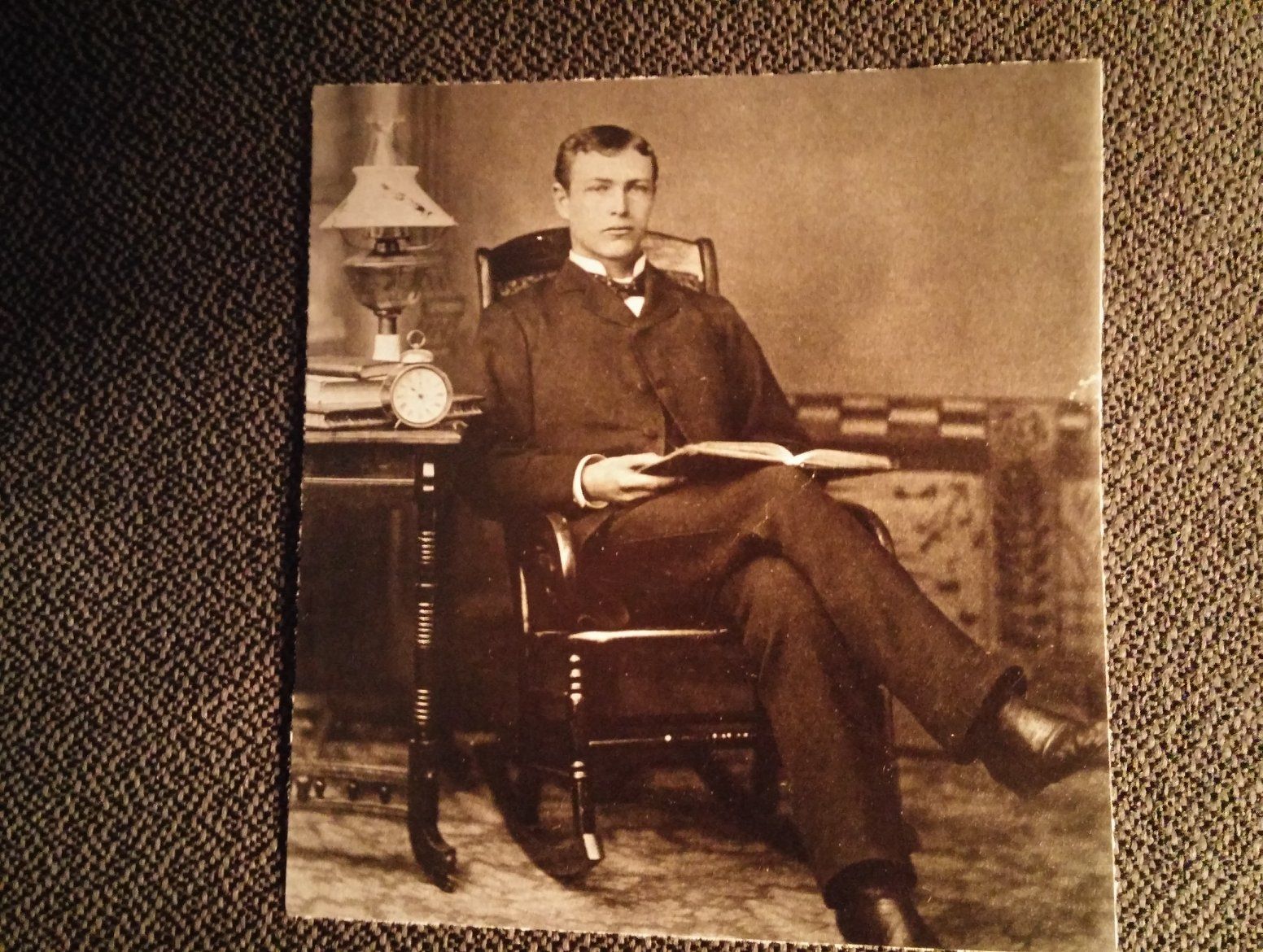Francis M. Chrisman was the proprietor of the store in which the infamous Christmas Eve fire of 1984 occurred. It was
one of the worst fires in Oregon's history.
SILVER LAKE, Ore. — Christmas Eve is usually a night of anticipation and excitement, of big-eyed kids wondering what the morning will bring.
That same sense of anticipation sparkled in the northern Lake County community of Silver Lake in 1894, when nearly 200 people gathered in the J.H. Clayton Hall above the Chrisman Store for a Christmas program. But before the night was over, 40 were dead and 34 others were injured, including three who later died of injuries resulting from a devastating fire.
The 24-by-50-foot hall was used by traveling evangelists, and for dramas and dances. It was reached by a narrow stairway outside the building. Two front windows provided light and ventilation.
According to accounts from survivors, the 1894 Christmas Eve audience was seated on long plank benches that faced the stage at the end of the building opposite the door. One survivor wrote that the room was lighted “by one huge brass coal-oil burner slung from the beams near the center of the hall and a small one mounted over the stage.”
The hall that day was made festive by paper chains and a community Christmas tree. Schoolchildren, some outfitted as angels with halos and wings, performed songs, poems, readings and skits and were anticipating the opening of gifts.
The program was nearly over when 18-year-old George Payne stood up, began walking along the benches and accidentally knocked the overhead brass coal-oil Rochester burner lamp.
Coal oil spilled and flared, causing the floor and ceiling to catch fire. Several people attempted to douse the blaze. As Payne and those nearby tried desperately to extinguish the flames, Francis Chrisman, the store owner, rushed to pull the lamp down and run it out the door (and sole exit). When Chrisman had nearly reached the exit to throw it into the street, another man trying to smother the fire with his overcoat inadvertently knocked the flaming lamp out of his hands. Several people tried to kick it out the door, but it was too late. Nearly a gallon of burning oil had spattered onto the wood floor and walls. Store owner Francis Chrisman grabbed the torchlike lamp and tried to carry it to the door, but oil ran down and burned his hand. He dropped the lamp, which was kicked around the floor, leaving behind a trail of oil, flames and smoke. The blaze quickly engulfed the building, causing the crowd to surge toward the exit whose door swung inward.
“It was just seconds after the lamp was hit that the place was a raging inferno,” Chrisman remembered.
The Christmas tree exploded and a kerosene lamp sitting on the organ was knocked over. Pushing and stumbling over the benches, the audience rushed to get out the one door. It only swung inward, further slowing their exit.
Within six minutes, the stairway had collapsed, the hall was completely on fire, and the only way out was to jump.
Within an hour, the building was smoking ruins. Forty people inside were dead and between 30 to 40 others were injured. The town doctor, W.M. Thompson, was making a house call 50 miles away, and the supply of pain remedies and topical treatments kept in the store had been destroyed. Silver Lake was miles from the nearest telegraph machine and railroad, and the stagecoach that took the mail wouldn’t arrive for several days.
On this freezing, snowy evening filled with despair, all the residents of Silver Lake had were each other.
The saloon across the street from the hall was turned into a first aid station, and those living close by ran home to rip up their sheets and pillow cases for bandages. Plans were quickly made to find medical care. While one man rode to bring back Thompson the town's physician, another volunteer, Ed O’Farrell, a 22-year-old cowboy, left on his horse to find another physician, Bernard Daly, who was nearly 100 miles away in the town of Lakeview. O’Farrell switched horses four times along the way, fresh horses offered without question by ranchers along the way. Braving temperatures of 20 degrees below zero and snow up to four feet deep, he arrived in Lakeview 15 hours later and found the doctor.
Daly swiftly gathered his supplies, and with another man, took off in a buggy drawn by two of the best horses in the area. Men on horseback broke a trail through the snow in front of them so they could make faster time. Daly arrived in Silver Lake at 6 a.m. Dec. 26. Thompson had returned two hours earlier.
Volunteers from the town of Paisley, 50 miles away, help collected the remains of the victim.
Five days after the disaster, the residents of Silver Lake and the vicinity gathered again, this time to bury their loved ones. The essentially cremated, bone fragment were collected and placed in a common casket. Forty people including two boys between the ages of 8 to 10, and 16 babies and young children had been killed. Almost everyone in the vicinity had lost a loved one. One family lost 15 members
.
Contributor: Jane Knoper (48244491) • [email protected]
View Memorial
Francis M. Chrisman was the proprietor of the store in which the infamous Christmas Eve fire of 1984 occurred. It was
one of the worst fires in Oregon's history.
SILVER LAKE, Ore. — Christmas Eve is usually a night of anticipation and excitement, of big-eyed kids wondering what the morning will bring.
That same sense of anticipation sparkled in the northern Lake County community of Silver Lake in 1894, when nearly 200 people gathered in the J.H. Clayton Hall above the Chrisman Store for a Christmas program. But before the night was over, 40 were dead and 34 others were injured, including three who later died of injuries resulting from a devastating fire.
The 24-by-50-foot hall was used by traveling evangelists, and for dramas and dances. It was reached by a narrow stairway outside the building. Two front windows provided light and ventilation.
According to accounts from survivors, the 1894 Christmas Eve audience was seated on long plank benches that faced the stage at the end of the building opposite the door. One survivor wrote that the room was lighted “by one huge brass coal-oil burner slung from the beams near the center of the hall and a small one mounted over the stage.”
The hall that day was made festive by paper chains and a community Christmas tree. Schoolchildren, some outfitted as angels with halos and wings, performed songs, poems, readings and skits and were anticipating the opening of gifts.
The program was nearly over when 18-year-old George Payne stood up, began walking along the benches and accidentally knocked the overhead brass coal-oil Rochester burner lamp.
Coal oil spilled and flared, causing the floor and ceiling to catch fire. Several people attempted to douse the blaze. As Payne and those nearby tried desperately to extinguish the flames, Francis Chrisman, the store owner, rushed to pull the lamp down and run it out the door (and sole exit). When Chrisman had nearly reached the exit to throw it into the street, another man trying to smother the fire with his overcoat inadvertently knocked the flaming lamp out of his hands. Several people tried to kick it out the door, but it was too late. Nearly a gallon of burning oil had spattered onto the wood floor and walls. Store owner Francis Chrisman grabbed the torchlike lamp and tried to carry it to the door, but oil ran down and burned his hand. He dropped the lamp, which was kicked around the floor, leaving behind a trail of oil, flames and smoke. The blaze quickly engulfed the building, causing the crowd to surge toward the exit whose door swung inward.
“It was just seconds after the lamp was hit that the place was a raging inferno,” Chrisman remembered.
The Christmas tree exploded and a kerosene lamp sitting on the organ was knocked over. Pushing and stumbling over the benches, the audience rushed to get out the one door. It only swung inward, further slowing their exit.
Within six minutes, the stairway had collapsed, the hall was completely on fire, and the only way out was to jump.
Within an hour, the building was smoking ruins. Forty people inside were dead and between 30 to 40 others were injured. The town doctor, W.M. Thompson, was making a house call 50 miles away, and the supply of pain remedies and topical treatments kept in the store had been destroyed. Silver Lake was miles from the nearest telegraph machine and railroad, and the stagecoach that took the mail wouldn’t arrive for several days.
On this freezing, snowy evening filled with despair, all the residents of Silver Lake had were each other.
The saloon across the street from the hall was turned into a first aid station, and those living close by ran home to rip up their sheets and pillow cases for bandages. Plans were quickly made to find medical care. While one man rode to bring back Thompson the town's physician, another volunteer, Ed O’Farrell, a 22-year-old cowboy, left on his horse to find another physician, Bernard Daly, who was nearly 100 miles away in the town of Lakeview. O’Farrell switched horses four times along the way, fresh horses offered without question by ranchers along the way. Braving temperatures of 20 degrees below zero and snow up to four feet deep, he arrived in Lakeview 15 hours later and found the doctor.
Daly swiftly gathered his supplies, and with another man, took off in a buggy drawn by two of the best horses in the area. Men on horseback broke a trail through the snow in front of them so they could make faster time. Daly arrived in Silver Lake at 6 a.m. Dec. 26. Thompson had returned two hours earlier.
Volunteers from the town of Paisley, 50 miles away, help collected the remains of the victim.
Five days after the disaster, the residents of Silver Lake and the vicinity gathered again, this time to bury their loved ones. The essentially cremated, bone fragment were collected and placed in a common casket. Forty people including two boys between the ages of 8 to 10, and 16 babies and young children had been killed. Almost everyone in the vicinity had lost a loved one. One family lost 15 members
.
Contributor: Jane Knoper (48244491) • [email protected]
View Memorial
Family Members
Sponsored by Ancestry
Advertisement
Advertisement
